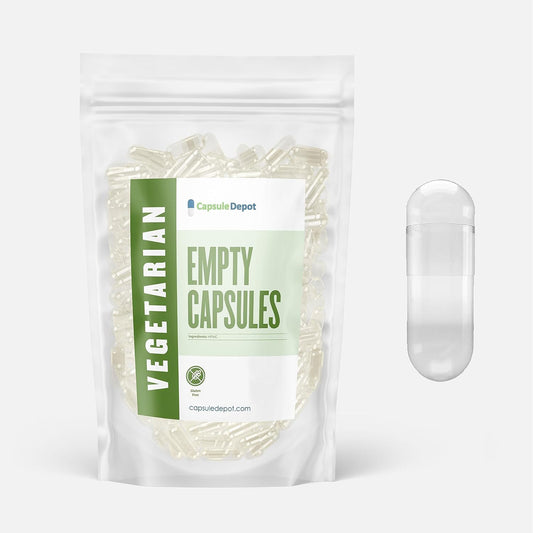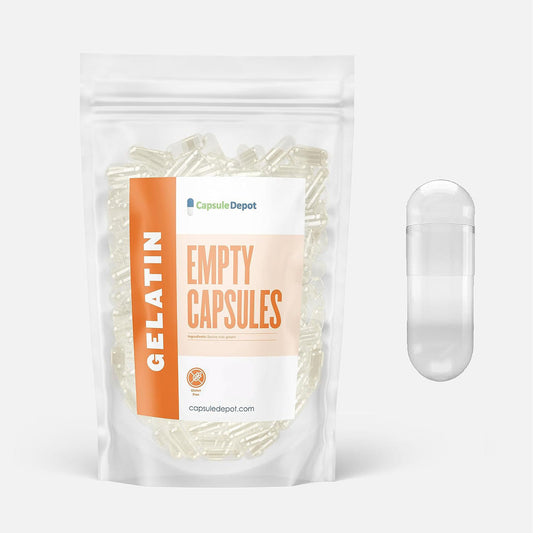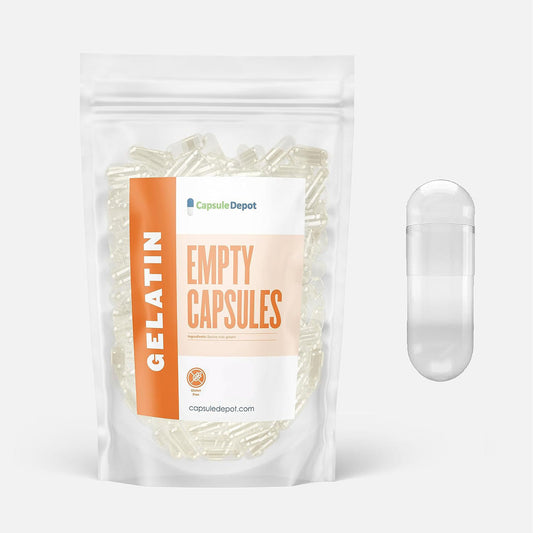With the expanding capsule options in the industry today, making the right choice for your manufacturing line can feel like navigating a maze. You ask — gelatin or vegetarian? HPMC or Pullulan? What’s cost-efficient today; and what aligns with tomorrow’s consumer expectations?
In this article, we will break down the core differences that matter for bulk buyers: composition, stability, cost, and consumer trends. We offer clear and practical advice grounded in industry experience so you can move forward in your procurements without the guesswork.
Capsule Depot-Branded Guidance

What we see most often: Top Capsule Needs among Manufacturers
Having worked with many supplement and pharmaceutical manufacturers globally, we can tell manufacturers typically seek a capsule option that meets their product’s technical requirements and also market demands. These top features can be summarized as:
- Excellent compatibility with a wide range of pharmaceutical or nutraceutical ingredients, e.g., herbal powders, inorganic solids, oils, enzymes, etc.
- Top performance in high-speed filling operations; maintaining good stability, fillability, and moisture content during runs.
- Good pricing stability; for better budgeting, and free of hidden costs like sudden scarcity or delivery delays.
- Demonstrable compliance with regulatory requirements (e.g. FDA or EFSA) and some other labeling requirements such as Halal or Kosher certifications where relevant.
- Excellent shelf stability in storage and long-distance refrigerated shipping options to prevent temperature fluctuations and guarantee product freshness.
- Strong alignment with contemporary market demands, e.g. clean label, vegan requirements, etc.
- High performance-to-price ratio, looking beyond unit price cost-effectiveness to ease of sourcing, product stability, and brand positioning as other important investment returns.
Gelatin vs Vegetarian capsules: comparing their composition
The fundamental difference between gelatin and vegetarian capsules lies in their source. Gelatin capsules are made from gelatin (derived from animal collagen, usually bovine or porcine). They are soft, flexible, and cost-effective. Hence, they are widely used across the industry.
Vegetarian capsules, by contrast, are plant-based. Made from materials like hydroxypropyl methylcellulose (HPMC) or pullulan, they suit consumers with specific dietary preferences, like vegans and vegetarians.
For manufacturers, then, capsule source matters. More brands today demand clean-label ingredients and transparency, especially catering to the increasingly influential plant-based or allergen-sensitive markets. Due to their plant-based origin, vegetarian capsules help manufacturers meet these requirements.
Additionally, the internal structure of vegetarian capsule materials confers on them better resistance to moisture and flexibility. This means a longer shelf life and more reliable storage capacity for the capsules. Therefore, if your products include moisture-sensitive or hygroscopic ingredients, vegetarian capsules typically provide better protection.

Performance in Manufacturing: Comparing Stability, Filling, and Dissolution
Capsule performance in the factory can make or break production efficiency.
Gelatin capsules are known for their smooth filling and fast dissolution, especially in high-speed machines. However, they are more sensitive to heat and humidity during processing.
Vegetarian capsules, particularly HPMC capsules, are more stable under varying environmental conditions. They resist brittleness and maintain integrity better over long runs and in storage.
Furthermore, dissolution rates among the duo can differ slightly. As established in studies and confirmed in actual use, gelatin capsules dissolve more quickly in the stomach compared to their HPMC counterparts. HPMC capsules may offer more controlled release, depending on the formulation.
For high-output lines or diverse formulations, vegetarian capsules often deliver better consistency and lower rejection rates.
Meeting Market Demand: Consumer Preferences and Labeling Requirements
Modern consumers care about what goes into their supplements — and the type of capsule in which they are held. Vegetarian claims are now becoming standard expectations from manufacturers, going beyond niche preferences.
As such, vegetarian capsules help brands meet their plant-based labeling needs. They also make a smart fit for clean-label strategies and allergen-free marketing.
Gelatin capsules, while effective and economical, might face more resistance from vegetarian, vegan buyers, although they still enjoy the sizable loyal market built over the years.
However, if your product is going on retail shelves or into global markets, labeling flexibility matters. Consumers compare your label offers with the competitor’s! Vegetarian capsules can give your brand broader consumer acceptance, market reach, and less regulatory friction.

Cost Comparison: Bulk Pricing and Production Efficiency
In bulk, gelatin capsules are generally more cost-effective. They are widely available, easy to source, and ideal for large production runs on a controlled budget.
Vegetarian capsules tend to cost more per thousand, given the higher cost of production, but they are a stable solution, especially for brands looking to promote the ‘natural’ approach or for moisture-sensitive formulations that require HPMC vegetarian capsules, such as formulations containing oil or water.
Consider total cost, not just per-unit price. If a capsule aligns better with your brand or reduces production setbacks, it may be the more economical long-term choice.
Capsule Depot offers both types in bulk, with competitive pricing and fast fulfillment, so you can choose based on what works best for your operation.
Making the Right Capsule Choice for Your Brand
There’s no one-size-fits-all capsule. The right choice depends on your formula, production setup, brand identity, and target market.
As general advice, choose gelatin capsules if cost efficiency and high-volume production are your top priorities. They are reliable, widely used, and ideal for standard supplement lines.
Choose vegetarian capsules if your brand leans toward the plant-based, clean-label market instead or caters to specialized dietary needs. Vegetarian capsules offer greater flexibility, market appeal, and better performance with moisture-sensitive ingredients.
Also, consider long-term positioning. As consumer demand shifts toward transparency and plant-based products, vegetarian capsules may future-proof your lineup, even at a slightly higher upfront cost.
At Capsule Depot, we have helped brands at every scale make capsule decisions that balance performance, compliance, and marketability. We are here to help you do the same.
We offer bulk empty gelatin and vegetarian capsules in various sizes and flavors, at very competitive prices. Look for Capsule Depot’s special pricing and exclusive offers.
Additionally, within our tailored wholesale program for manufacturers, our team supports you in working out the best strategy for your brand, backed by a robust shipping network for a timely delivery of orders. Contact us today to get started!
Bottom line: Confident Choices Begin with Clarity
Whether you need efficiency, flexibility, or a clean-label edge, you’re now equipped to make the right call for your brand. At Capsule Depot, we are on a mission to support manufacturers in making smart, scalable, and profitable capsule decisions.
Whichever capsule fits your product line best, we are ready to support you with high-quality, competitive prices and superb U.S based customer service.








